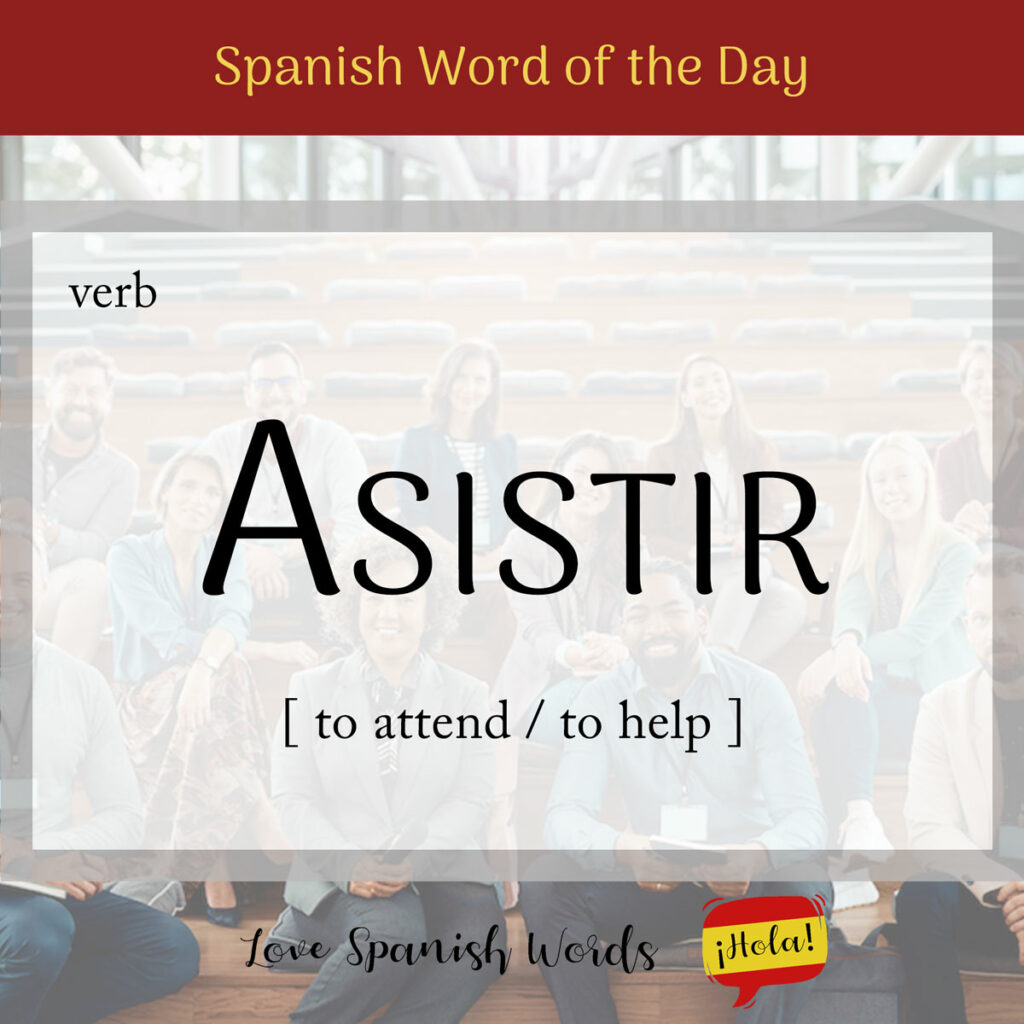The Spanish word asistir originates from the Latin word assitere. The word has multiple meanings, but the two main definitions are to attend (as in “to show up and be at a place”) and to help.
Latin American Pronunciation
European Pronunciation

The word asistir is a transitive and intransitive verb. The present, past and future conjugations are:
- yo asisto
- tú asistes
- él/ella/usted asiste
- nosotros/as asistimos
- vosotros/as asistís
- ellos/ellas/ustedes asisten
- yo asistí
- tú asististe
- él/ella/usted asistió
- nosotros/as asistimos
- vosotros/as asististeis
- ellos/ellas/ustedes asistieron
- yo asistiré
- tú asistirás
- él/ella/usted asistirá
- nosotros/as asistiremos
- vosotros/as asistiréis
- ellos/ellas/ustedes asistirán
Asistir = to attend
Asistir primarily means to be present or to go to a place and remain there, or in other words, to attend. We use the word when referring to attending a public function such as a wedding, concert, or any other event. For example, El actor no pudo asistir a la entrega de premios (The actor couldn’t attend the award ceremony).
Synonyms include acudir (to go), presentarse (to show up), and estar (to be in a place). It can also be used in reference to a place you show up to frequently such as school or church. For example, Mis hijos asisten a una escuela privada (My kids attend a private school).
Mi hermana va a asistir a la fiesta de cumpleaños el sábado.
My sister will attend the birthday party on Saturday.
Quiero asistir a la universidad de Harvard.
I want to attend Harvard University.

Asistir = to help
Now let’s look at the second definition of this word, which is to assist, to help or to take care of someone. It’s used for various types of help. Let’s go over them now.
Asistir is used when offering help in difficult situations, such as assisting someone who has fallen or providing aid in serious situations, such as administering CPR. For example, El oficial va a asistir al conductor a cambiar la llanta pinchada (The police officer is going to assist the driver in changing the flat tire). Synonyms include ayudar (to help) and auxiliar (to provide aid).
Asistir is also used to describe looking after someone who is sick or in need of care. For example, Contraté a una enfermera para asistir a mi abuela (I hired a nurse to care for my grandmother). Synonyms for this type of assistance include cuidar (to take care of) and atender (to serve/assist).
When assisting someone with a project or providing service in exchange for payment, asistir is also used. This form of assistance involves helping to accomplish or complete something, such as an employee aiding their boss in finishing a project or a child helping their mother clean the house. Synonyms for this context include colaborar (to collaborate) or servir (to serve).
La maestra va asistir al niño que se cayó.
The teacher is going to help the child who fell.
El médico asistió al conductor que tuvo un accidente automovilístico.
The medic helped the driver who had an automobile accident.

When learning the word asistir, it’s important to consider the Spanish word atender, which shares the same definitions. In Spanish, you can use either word for both scenarios: helping or showing up to an event. This simplifies things for English speakers learning Spanish because they can use either word and likely be correct.
However, for Spanish speakers learning English, it can be confusing. To attend in English is used to describe showing up or being present at an event, while to assist is used only to describe helping someone. You don’t use to attend to say you will help, and you don’t use to assist to say you will show up to a party.
For example, in English, you can’t say, I’m going to assist the game tonight. The correct way to say it would be, I’m going to attend the game tonight. But in Spanish, you can use either word: Voy a atender el partido esta noche or Voy a asistir al partido esta noche.
Similarly, you can’t say, The nurse will attend the patient. You would say, The nurse will attend to the patient. This small difference — adding “to” changes the meaning, making it equivalent to asistir in Spanish. The Spanish translations of that sentence can be either: Voy a atender al paciente or Voy a asistir al paciente.

